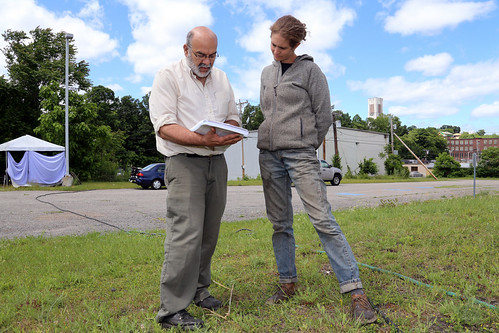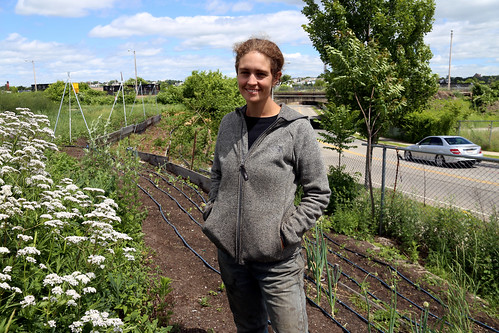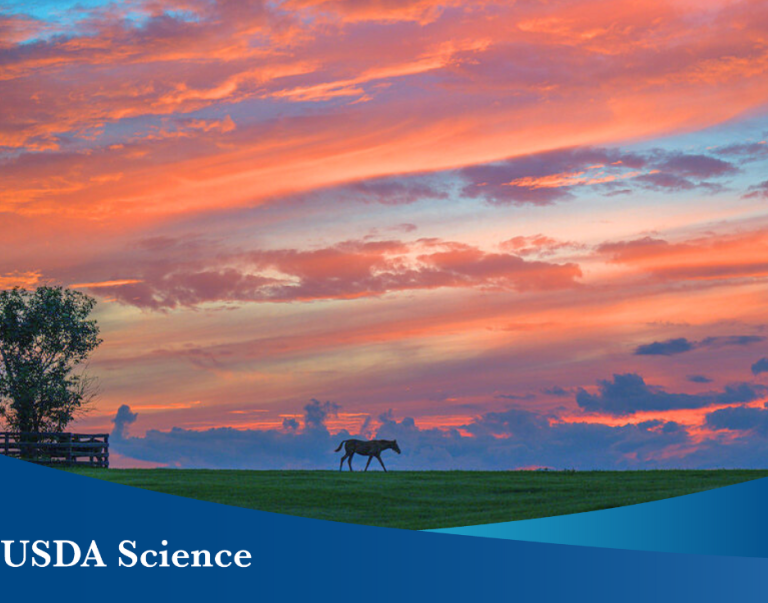
When Amanda Barker arrived in Worcester, Massachusetts, in 2009 to start graduate school at Clark University she knew that she wanted to grow food and build community. “My hope was to figure out a way to connect people with food, get people talking to each other,” said Barker.
Seven years later, she is one of the nation’s urban agriculture pioneers who raises crops on tiny patches of land wedged between city buildings, used car lots, highways and railroad tracks, and even on rooftops.
As director and farm manager of Nuestro Huerto (Spanish for “Our Garden”) Community Farm, Barker and her corps of volunteers are raising vegetables, fruit, herbs, and greens on a third-of-an-acre behind a church in Worcester’s south end.
The City of Worcester, the second largest city in New England, is located about 30 to 40 miles west of Boston and about halfway between the New Hampshire and Rhode Island borders. It has an industrial history. The land was previously used as a storage ground for an iron foundry; the soil was tested and found to be free of contaminants.
“We were able to start growing here with the help of soil brought in,” said Barker. “It's not really tillable land. It's got a lot of rocks in it, so we've been putting compost on top and are growing in that,” explained Barker.
The City of Worcester makes compost from leaf and yard waste and makes it available to city residents and community gardens. “If we didn't have it we wouldn't have a farm,” said Barker.
In addition to the usual challenges that go with farming: weather, labor and pests, urban farming brings its own unique concerns, such as security. A car wreck recently damaged a fence and nearly took out crops at Nuestro Huerto.
Barker’s biggest hurdle was inadequate irrigation. The drip irrigation system that she connected to the church’s water supply wasn’t getting enough water to the crops.
At an urban agriculture conference, she learned that USDA’s Natural Resources Conservation Service helps growers with irrigation efficiency, so she reached out to NRCS District Conservationist Dan Lenthall for help.
“Dan came out here to check it out and we had conversations about the soil, as well, which is always something I'm interested in improving,” said Barker.
Lenthall quickly figured out that pressure loss due to the distance from the building to the beds limited the amount of water that was getting to the individual drip lines and proposed a solution.
“I think a unique aspect to urban agriculture is the scale, trying to bring in enough income to sustain the amount of labor that it takes. It's all done by hand,” said Barker. “Even though it's volunteer-run, you still need money to operate.”
“This is not a typical farm, but it is more and more typical of small urban farms. Most urban farms are less than an acre. They have different concerns, they're very detail oriented. There's a few feet of this crop, followed by a few feet of another crop,” said Lenthall.
Nuestro Huerto sells its produce through a Community Supported Agriculture (CSA) membership program. They also donate produce to a local residential recovery program facility.
“It's a community, it's a family. I think that, long term, it's healthier for everybody to have these connections. It creates a more resilient community and society,” said Barker.



